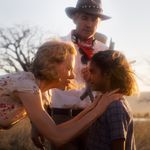
Welcome back, The Curse fans. We are, so far, a slight contingent (a subset of the people who subscribe to Showtime — already a select group), but what we lack in numbers we make up for in cringe endurance. After letting myself down viewing The Rehearsal and Nathan for You, I made a promise to myself: No pressing pause for the duration of this series. I would take the excruciating awkwardness of every Nathan Fielder choreographed moment like a pro. I did not intend to leave myself any loopholes, and yet this week, in Bill’s casino office, I instinctively muted my computer when the Gatorade showers began. I promise to do better.
Without word from HGTV about whether Flipanthropy is getting picked up, “Pressure’s Looking Good So Far” sees our central trio at loose ends. Most of the action belongs to Fielder’s Asher, who still hasn’t managed to get Monica to squash the brand-compromising interview he gave last week. He’s promised her a story about Whistling River Casino preying on gambling addicts, but what he’s delivered so far is a combination of readily available information, creepy self-recordings, and enough Cornell name-dropping to satisfy Andy Bernard. (Side note: This week’s teleplay was written by Office alum Carrie Kemper.)
But Monica needs hard evidence of the tribe’s wrongdoing. The problem is it’s locked away in the casino’s back offices. So Asher reconnects with his old buddy Bill and invents reasons to drop by Whistling River. It’s fascinating to see him in a new environment without Dougie’s sneering and Whitney’s constant corrections. Last week, he seemed like an ineffectual loser, but on the pit floor, he’s more like an evil genius. Who outfitted the casino’s non-ambulatory gamers with wristbands so they never have to hit the ATM (or leave the slot machines)? It’s Ashman! And whose idea was it to manipulate a sense of time with circadian lighting? Ashman strikes again!
On a second visit to the casino, Bill gets Asher a meeting with his old boss to pitch another nefarious idea: a gaming zone for kids inside the casino. Just as Småland frees Ikea shoppers to buy more meatballs and Kids Club frees Equinox members to, well, spend more time on their phones in the locker room capitalizing on discount child care, so will “Kids Quest” free gamblers to spend more time at the tables. An overeager Asher offers to start working up the proposal ASAP, but the casino boss seems relieved to be free of him. It’s time for plan B. If Asher can’t steal the files he needs by getting back on the payroll, he’ll just steal them behind Bill’s back.
Which brings us to my moment of weakness. Asher insists Bill take him back to his computer to show him a viral video. I wrongly assumed Asher would have developed a cunning plan, but Ocean’s Eleven this is not. Instead, to get Bill out of the office, he attempts to “accidentally spill” red Gatorade on his friend. When he misses, Asher just purposely spills red Gatorade on Bill. And when Bill gets agitated at this hilarious prank, Asher spills red Gatorade on himself. Because men are weird, this somehow defuses the tension to the point where Bill goes to fetch Asher a dry T-shirt to wear home. While Bill’s out of the office, he downloads some files onto a thumb drive; I will not be so naïve as to assume he’s downloaded the correct files.
But as Asher Siegel strides confidently through the pit with the top-secret files in his pocket, he crosses paths with the saddest man in all of Santa Fe — his producer, Dougie. Dougie has no reason to be in Santa Fe while the show awaits its fate. It’s just that he has no reason to be anywhere else. It’s on a first date that we learn how Dougie came by his general run-down demeanor, and the backstory is so sad and audacious that, at first, I worried it was an attempt to get laid.
Dougie was driving drunk when his car was “T-boned,” and his wife died in the accident. But it’s not his fault because the other car ran a red light, and it’s not his fault because if he had refused the cop’s Breathalyzer test on the scene and insisted on being tested back at the station, he probably would have been back under the limit. And it’s not Dougie’s fault because the alcohol field test is unreliable anyway. Just when you start thinking Dougie buys his own innocence, the date asks him if he would have been driving more defensively if not for the alcohol. “It’s kind of all I think about, really.” His friends were his wife’s friends, and now he has none. There’s nothing for Dougie in Santa Fe, but there’s nothing waiting for him at home in New York, either.
In truth, I wasn’t 100 percent sure the exchange wasn’t some perverse Dougie bit until the moment he Breathalyzed himself on the drive home. When he blows red, he pulls over and walks his date home. It feels as pathetic as TV can get, and yet The Curse manages to milk the moment for just one more dreadful observation of modern life. “Most guys would have kept going, but you pulled over,” the date tells him — a woman who has been seduced by a man who surely should have lost his license by now. “I like that.”
And lastly, we have Whitney, who isn’t so much a person as a walking bag of frayed nerve endings. She starts the episode with good news: She and Asher are having a baby — a lil eco-flipper of their very own. Bring on the sad beige clothing and one of those canvas kid’s room teepees. This child will be monochromatic, carbon neutral, and co-sleeping.
Whit waits a day to tell her husband, which I personally think is reasonable, even if Asher bristles at being given the happy news under the bright lights of the Jambo Cafe. But for Whitney, impending motherhood is not the focus of “Pressure’s Looking Good So Far.” On the morning when she sees the pink lines appear, she is meeting James — the governor of the San Pueblo tribe — to talk about what Flipanthropy can do for his community. It’s hard to question that her desire to be an ally to Native Americans is sincere; it’s just that she’s so busy insisting that she’s doing the learning that she never shuts up to learn. And she’s so eager to have Native American friends that she ignores how friends are made: with patience and sharing.
Take Cara Durand (played by Nizhonniya Austin), a local artist whose work Whitney and Asher have bought for their own home. Whitney calls Cara a close friend, but she acts more like a toady would-be patron, offering to buy and deliver takeout meals so Cara can focus on her upcoming gallery opening and forcing a connection between Cara and James that Cara doesn’t care about. And Whitney, in truth, doesn’t want friendship in return. She wants Cara to appear on her TV show as a “cultural consultant”; she wants Cara to tell her it’s okay to be white in Santa Fe.
It’s awful to watch, and yet you can’t help but pity Whitney, one of the most uncomfortable characters I’ve ever seen on TV. I can’t think of another so uniquely lacking in charm and confidence, talent and guile. Whitney is what’s left when you strip back everything except a desire to be loved by people who have no reason to love her.
She’s just as boring and unbearable at the opening of Cara’s show, which we’re told by Whitney is about de-romanticizing notions of Native American identity. For one piece, Cara assembles a shadowbox of racist Major League Baseball figurines that she’s stolen from stadium shops. For another, Cara sits across from an attendee in a small teepee and offers them cold cuts of turkey. Regardless of whether or not the person eats the deli meat — Whit does, technically a violation of pregnancy-food safety rules; James doesn’t because he’s been warned off by Whit — Cara screams in their faces. Obviously, Whitney is desperate to be invited to the after-party.
This is a new aspect of Whitney’s ambition introduced in this episode: her desire to be respected as an artist. On Instagram, she deletes comments from those who tell her she’s ripped off Doug Aitken, which is a fair enough critique. But frankly, I think she could do more to defend her use of mirrored houses to accomplish entirely different goals. Aitken’s house disappeared into the landscape. Whitney’s are urban and obnoxiously unchanging, intended to reflect a community of Pueblo Indians that isn’t going anywhere — that’s been on this land longer than anyone. When Cara tells her not to worry about the trolls because Whitney’s not an artist anyway, it’s a total jellyfish. Cara didn’t invent shadowboxes or sitting close to strangers in a gallery space. She’s a snob and kind of an asshole.
Not that Whitney sees that. The pregnancy, Whitney and Asher learn soon, is ectopic. Whether it’s a form of self-preservation or simply obsession, she’s already talking about their next house project in the doctor’s office parking lot, while Asher sets a phone reminder for six weeks from now — the first day they can start trying for a baby again. Whitney is considering mosaic glass this time around, which will deflect the Cara-endorsed Aitken criticism (and probably be safer for the Santa Fe bird population, anyway). And that, to me, is the most compelling thing about Whitney so far — just how much she wants to be noticed and how much she wants to completely disappear at the same time.




